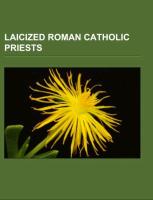- Start
- Laicized Roman Catholic priests
Laicized Roman Catholic priests
Angebote / Angebote:
Source: Wikipedia. Pages: 30. Chapters: Barthélemy Boganda, Ivan Illich, Pierino Gelmini, Fulbert Youlou, Neil Horan, Peter Levi, Defrocking, Dale Fushek, Alberto Cutié, Paul Shanley, Charles Chiniquy, James Carroll, John McLaughlin, Michael Charles Glennon, Louis Evely, James Porter, Michael Ledwith, John Geoghan, Peter Hebblethwaite, Luke Timothy Johnson, Juan María Fernández y Krohn, Paudie Fitzmaurice, Bruce Kent, Xabier Arzalluz, Frank Cordaro, Donald Kimball, Robert A. Ward, Francesco Calcagno, Michael Harding, Phillip Berryman. Excerpt: Barthélemy Boganda (4 April 1910 - 29 March 1959) was the leading nationalist politician of what is now the Central African Republic. Boganda was active prior to his country's independence, during the period when the area, part of French Equatorial Africa, was administered by France under the name of Oubangui-Chari. He served as the first Prime Minister of the Central African Republic autonomous territory. Boganda was born into a family of subsistence farmers, and was adopted and educated by Roman Catholic Church missionaries. In 1938, he was ordained as the first Roman Catholic priest from Oubangui-Chari. During World War II, Boganda served in a number of missions and after was persuaded by the Bishop of Bangui to enter politics. In 1946, he became the first Oubanguian elected to the French National Assembly, where he maintained a political platform against racism and the colonial regime. He then returned to Oubangui-Chari to form a grassroots movement in opposition of French colonialism. The movement led to the foundation of the Movement for the Social Evolution of Black Africa (MESAN), and became popular among villagers and the working class. Boganda's reputation was slightly damaged when he was laicized from the priesthood after marrying Michelle Jourdain, a parliamentary secretary. Nonetheless, he continued to advocate for equal treatment and civil rights for blacks in the territory well into the 1950s. In 1958, after the French Fourth Republic began to consider granting independence to most of its African colonies, Boganda met with Prime Minister Charles de Gaulle to discuss terms for the independence of Oubangui-Chari. De Gaulle accepted Boganda's terms, and on 1 December, Boganda declared the establishment of the Central African Republic. He became the autonomous territory's first Prime Minister and intended to serve as the first President of the independent CAR. He was killed in a mysterious plane crash on 29 March 1959, while en route to Bangui. Experts fo
Folgt in ca. 5 Arbeitstagen
